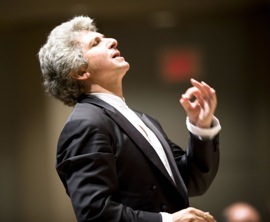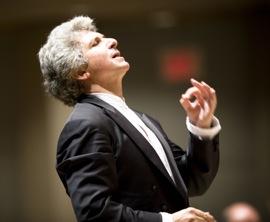
It’s called focal dystonia. It’s a degenerative muscle disease that has affected the lives of several famous musicians, including two who recently performed in the Bay Area. Their stories, however, are quite different.
When Leon Fleisher lost the use of his right hand, he went through a near-suicidal depression before he reemerged as a proponent of the left-hand repertory. It was only in the last few years that treatments have allowed him to return to the stage as a two-handed master of the keyboard.
In contrast, Peter Oundjian, the former first violin with the Tokyo String Quartet, made the decision to call it quits in 1994 (after 14 years with the ensemble) when he could no longer perform at the level he required of himself. Oundjian’s solution was to take up the baton. And since 2003 he has held the post of music director of the Toronto Symphony, working in the city where he was born, in 1955. Last week Oundjian conducted the San Francisco Symphony. I spoke with him then.
I was curious. Since you’ve spent so much of your life in England, did you stay up to watch the Royal Wedding?
[Laughs] No. I could have. We were having dinner after the concert with my cousin, Eric Idle, of the Monty Pythons. About 12:30 Eric looked at his watch and said, “Oops, gotta go.” He invited me to join them for a wedding-watching party but I said, “No, thanks.”
Featured Video
Related Article
Recipe for Seduction at the S.F. Symphony
Engage Peter Oundjian as guest conductor. Mix and serve.
What’s been the impact of having a member of Monty Python for a cousin?
Eric’s fantastic and very knowledgeable about music. He flew up here from L.A. just because I was conducting. We actually worked together on a piece called Not the Messiah, which is an oratorio version of The Life of Brian. We performed it several times, including at the Hollywood Bowl. There’s a DVD. It’s quite funny.
Leon Fleisher was just in the Bay Area performing, and I know you and he suffered from the same disease. Do you know him?
I know him very well. When I first noticed what was happening to my hand, I immediately thought of Leon. He sent me to various specialists, who were very helpful. But, unlike Leon, I made the decision not to continue playing. Having said that [laughs again], I’ve committed myself to playing the Bach Double Concerto next season with my teacher, Itzhak Perlman. I still don’t know why I did it — it’s been 16 years since I stopped playing. But it’s in the season brochure, saying that I’m going to be playing. We’ll see what happens.
You don’t seem to have any regrets about your transition from performing to conducting. For Leon Fleisher it was a terribly traumatic experience.
I don’t think it was traumatic for me. I had a very different attitude. Leon was a fair amount younger when this happened to him than I was. I played until I was 39, and I played 2,000 concerts on the violin. I had a wonderful career and had appeared on every stage you could imagine [including Sesame Street]. I also had a passion for conducting that I had put aside when I decided just to be a violinist. So there was a certain kind of logic to what was happening to me. I felt almost as though it was fate. That was in 1994.
André Previn played a key role in helping you make the transition to conducting, didn’t he?
André was extremely generous to me, from the moment I realized I was going to have to stop playing and wanted to resume my conducting activities. He invited me to his home [in 1994 Previn was living in Pittsburgh]. He spent several hours talking to me about the business of conducting, not about technique. It was fascinating, and crucial for me at that moment. At the end of that meeting he said he wanted me to conduct at the opening night for the 50th anniversary of the Caramoor Festival [in Katonah, N.Y.]. I said, “But you’re conducting that concert.” And he said, “Yeah. But I would like you to conduct a few pieces.” I couldn’t believe his generosity.
When I was doing research on your career, I read that in 1976 when you were a student at Juilliard you suddenly found yourself asked to conduct for Herbert von Karajan. That must have been intimidating. Could you tell the story?
Oh gosh. Sure. That was scary. I was studying conducting at Juilliard, but I wasn’t one of the five conducting majors; violin was my major. I was concertmaster, and one day Karajan (who was briefly in residence) came in and watched us doing our thing, which included me playing the solos from the Brahms First Symphony. The next day he asked me [putting on a stern German accent], “Do you conduct?” I had no idea why he would be asking me, but I didn’t want to be dishonest so I said, “Yes. I’m studying conducting, actually.” He said, “Oh, very goot. Then you will conduct later.” I nearly had a heart attack because traditionally there’s nothing the music students enjoyed more than making the conducting students look bad.
Well, the moment came and everyone was there: Christoph Eschenbach, Seiji Ozawa, the head of Deutsche Grammophon, the head of Columbia Records, the president of Juilliard. They all thought this was going to be the moment when the great maestro showed us all how it was done. I was the only one who knew what he was planning, and I couldn’t believe it. He turned to the audience and said, “The concertmaster will now conduct.”
I stood up. He was three feet from me, staring at me and covering up the music! He said, “Don’t look. You know it. You know it,” which was hardly true. So I conducted and, of course, they played beautifully, as if he were conducting. Afterward, people were joking, saying I was going to give up the violin because Karajan had said how good I was. Years later when my hand started to get bad, I looked back on that experience and it had great value for me.
Tell me about your family background. It’s quite an interesting mix.
It’s Scottish, English, French, and Armenian. My father was 5 when his family fled from Istanbul to avoid the genocide. My parents met in England during the war, then moved to Canada, then back to England. I’m the youngest of five kids and we are all either skaters or musicians. I have a nephew who was just playing in the Stanley Cup playoffs for the Chicago Blackhawks — he scored the winning goal in game 6. His brother is an oboist. My middle brother, Haig, was British Figure Skating Champion in 1969, ’70, and ’72.
Were you into sports, too?
Absolutely. What I really wanted to do was be a soccer player. But it didn’t happen.

